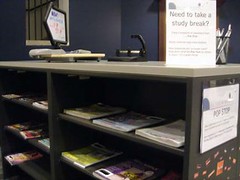Provide computers for students who do not have them. We often make assumptions about our students. Today's net generation students are always connected, so they must all have a laptop, right? The 2008 ECAR Study of Undergraduate Students and Information Technology reports that 16.8% of survey respondents own a computer older than four years and 1.5% own no computer at all. While this is a minority, there are students who still have no computer at all or have one so old it is likely not much more than a glorified typewriter. This doesn't account either for those students who might have a computer but still have dial-up access; my step-sister falls into that category and certainly she would choose a campus lab over trying to work over a painfully slow connection. Granted, the percentage of students who own a laptop increases each year, but it still isn't all students, and short of a mandated laptop purchase program, it probably won't be for quite some time.
Access to specialized software and equipment. For those connected students who do have a fairly new personal laptop, it is likely that they do not have access to SPSS, Matlab, ArcView, and other specialized software packages. Even Photoshop or other components of the Adobe Creative Suite--why pay for those applications if you only need them for a single class? For those students who run an alternative OS at home, they may need access to Windows or a Mac platform. In addition to software, labs usually offer scanners and printers that students may not have access to at home. Space in a typical residence hall room is at a premium--if you even own a printer and/or scanner, why would you take up precious space when you could use the shared resource in the lab?
Convenience. If you have a short break between classes, it usually isn't worth going back to your room. This is particularly true of commuter students who often camp out for most of the day on campus. What a great opportunity to get some work done in between classes--check the course management system, email, Facebook of course, and maybe start writing a paper or doing some research with library databases. For those who have a laptop, who would want to lug it around all day, particularly if it is a 4+ year old brick. Even if the laptop is light, why carry it and risk theft or damage--the parents would not be happy! So enter the computer lab (and the library) for computers available for general use at students' convenience. I realize the convenience argument has less weight in these difficult budget times, but knowing students, I suspect it remains a much higher priority for them than we realize.
So what's the answer? "Yes, but..."?
Obviously there will be fewer and fewer students who need the labs because they have no other computing access. It will be a slow process for 100% of our students to be connected, but that doesn't prevent us from slowly reducing the number of lab machines.
As far as specialized software, more institutions are looking toward virtualization, something that I personally find very appealing. If I bring my own computer to the lab, why can't I use campus-licensed software on it? There are several notable virtualization projects out there already, and I expect we'll see more of these in the next couple of years. I hope many institutions consider putting resources into this area.
So as we are slowly reducing our number of machines, perhaps reducing our entire footprint on campus by consolidating labs as well, and we are working toward a more virtualized environment, what do we do with our lab spaces? As a commons person, I do like Virginia's solution:
ITC understands that students need collaborative space where they can bring their laptops and mobile devices to conduct group work, especially as the curriculum becomes increasingly team- and project-based. As one example of how this need might be addressed, the computing lab on the fourth floor of Clemons Library was recently repurposed. This space has been transformed into a technology-rich collaboration area in a joint effort between the Libraries, ITC, Office of the Provost, Facilities, and Housing.Basically they have transformed the area into a commons-like space. Very cool.
I hope this becomes a trend to reinvent computer lab spaces in this fashion. Last year IT on my campus reduced the number of machines in a few labs and added/rearranged furniture to create spaces that were more comfortable and conducive to group study. These redesigned spaces have affectionately been dubbed "hublets" as IT sought to capture some of the elements of the Hub in these labs. More on that in a future post.



